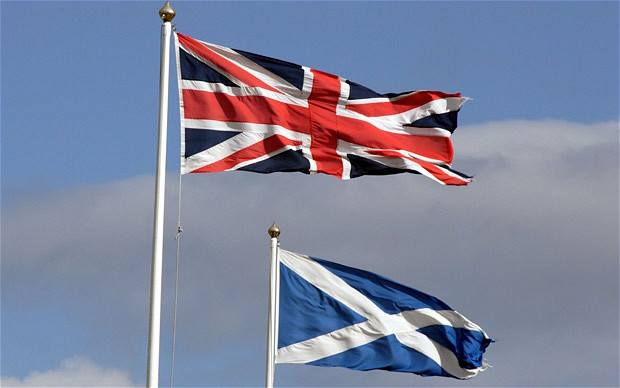Why Is Scotland's Referendum Already A Black Swan? Cataclysmic Uncertainty
London, UK - 14th September 2014, 12:20 GMT
1. The pound sterling is falling. It has already fallen by 6% over the past two months. Sterling may yet fall further next week in the absence of official intervention. Investors pulled out around GBP 17 billion from the British economy last month as fears that Scotland could go independent began to hit the prospects of the whole United Kingdom. More money flowed out of British assets in August than at any time since the height of the financial crisis during the collapse of Lehman Brothers in September 2008. Over the course of this year, more than GBP 120 billion has been pulled out of British financial assets, compared to a net gain of around GBP 40 billion in 2013.
 The Union Jack Next to The Saltire or St Andrew’s Cross of Scotland
The Union Jack Next to The Saltire or St Andrew’s Cross of Scotland
2. Deutsche Bank -- Germany's largest bank -- chief economist David Folkerts-Landau states: "Everyone has the right to self-determination and to exercise his or her democratic rights. But there are times when fundamental political decisions have negative consequences far beyond what voters and politicians could have imagined. We feel that we are on the threshold of one such moment. A "Yes" vote for Scottish independence on Thursday would go down in history as a political and economic mistake as large as Winston Churchill's decision in 1925 to return the pound to the Gold Standard or the failure of the Federal Reserve to provide sufficient liquidity to the US banking system, which we now know brought on the Great Depression in the US. These decisions -- well-intentioned as they were -- contributed to years of depression and suffering and could have been avoided had alternative decisions been taken." Mr Folkerts-Landau compared an independent Scotland to struggling eurozone countries such as Ireland, Spain and Portugal, claiming that investors would stay away due to the uncertainty caused by a break-up of the Union. He also predicted that Scotland would have to undergo a period of severe austerity in order to establish itself as a credit-worthy economy.
3. Nomura -- one of Japan's oldest, biggest bank and broker-dealer -- has been advising its clients to withdraw funds from the UK until after the poll in case the pound suffers extreme downturns in value. Nomura described such an outcome as a 'cataclysmic shock'.
4. Société Générale -- France's third largest bank -- figures show an apparent flight of capital from the UK. Investors have been pulling funds out of the UK for weeks and months, according to data on UK stock market funds cited by Société Générale, which show a worsening exodus of global money from shares in British companies.
5. A large number of businesses and entrepreneurs, including John Lewis, BP and Sir Richard Branson, have previously come out against independence and urged the people of Scotland to vote "No" next week.
6. The City of London is one of the most important financial centres on the planet where more than a trillion dollars are exchanged every day. If and when anybody rattles that kind of platform, other forces come into play. It is no longer about politics, it is about money.
7. There is no doubt within the minds of many ATCA 5000 distinguished members that a "Yes" vote next week would constitute a "Black Swan" or "Low Probability High Impact" event for the UK financial markets and possibly beyond. A "Yes" vote would materially raise the level of uncertainty associated with all UK financial assets.
8. However, the risk today of a Scottish "Yes" vote may be enough to move markets in advance of the referendum. Rational investors need to think now about positioning their portfolio for a possible "Yes" vote later this coming week.
9. Such anticipatory market activity could have a self-fulfilling impact. For example, if investors worry that a run on Scotland could result in a deposit moratorium, a run could occur before 18th September. Further, a run on Scotland could prompt a run on UK financial assets.
10. There is an enormous supra-national interest that resides in the UK financial world which is in a semi-panic mode about how much money can be lost not just because of a UK break-up, but because of the uncertainty surrounding that potential break-up.
11. The entire financial world, of which the City is a large part, has been caught on the wrong foot as much as the UK government.
12. The City of London will now do even more not to lose a substantial part of their wealth. And this time around, many distinguished members of ATCA 5000, don’t think they properly hedged their bets: the surge of the "Yes" side is as close to a black swan as we, and the City of London, have seen since September 2008.
13. Neither the Yes side nor the No side have gone into this thing terribly prepared; there are hundreds of questions surrounding the independence issue that won’t be solved before the vote takes place: passports, currencies, central banks, monetary unions, there’s too much to contemplate.
14. The reasons ATCA 5000 distinguished members think it may get out of hand regardless is that there is not one side that was ever prepared for the situation in which they find themselves today. Further, Scotland may not be financially viable and could go bankrupt. The former British Prime Minister, Gordon Brown, has said Scotland spends GBP 40 billion a year on health, education, pensions and benefits – but would make just GBP 2.9 billion from oil in year one.
15. With four more days to go until the vote that could end the 307-year-old union, major question marks hang about the stability of currency of an independent Scotland, what form it will take, or how much national debt it would take on. This is already a black swan given the high probability of a "Yes" outcome and the uncertainty that it is already creating on an enormous scale across the interconnected global financial markets.
[STOPS]
What are your thoughts, observations and views? We are keen to listen and to learn.
Best wishes

D K Matai
ATCA: The Asymmetric Threats
Contingency Alliance is a philanthropic expert initiative founded
in 2001 to resolve complex global challenges through collective
Socratic dialogue and joint executive action to build a wisdom
based global economy. Adhering to the doctrine of non-violence,
ATCA addresses asymmetric threats and social opportunities arising
from climate chaos and the environment; radical poverty and microfinance;
geo-politics and energy; organised crime & extremism; advanced
technologies -- bio, info, nano, robo & AI; demographic skews
and resource shortages; pandemics; financial systems and systemic
risk; as well as transhumanism and ethics. Present membership
of ATCA is by invitation only and has over 5,000 distinguished
members from over 120 countries: including 1,000 Parliamentarians;
1,500 Chairmen and CEOs of corporations; 1,000 Heads of NGOs;
750 Directors at Academic Centres of Excellence; 500 Inventors
and Original thinkers; as well as 250 Editors-in-Chief of major
media.
The Philanthropia, founded in 2005, brings together over
1,000 leading individual and private philanthropists, family offices,
foundations, private banks, non-governmental organisations and
specialist advisors to address complex global challenges such
as countering climate chaos, reducing radical poverty and developing
global leadership for the younger generation through the appliance
of science and technology, leveraging acumen and finance, as well
as encouraging collaboration with a strong commitment to ethics.
Philanthropia emphasises multi-faith spiritual values: introspection,
healthy living and ecology. Philanthropia Targets: Countering
climate chaos and carbon neutrality; Eliminating radical poverty
-- through micro-credit schemes, empowerment of women and more
responsible capitalism; Leadership for the Younger Generation;
and Corporate and social responsibility.

